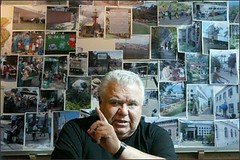A (too brief) interview with Jaime Lerner
 Dan DeLong / Seattle Post-Intelligencer. Jaime Lerner, former mayor of Curitiba, Brazil, says: "If you present the solution as a bus, it's a bus. If it's a system, the people will understand." Or -- "Toda cidade é um agente de transformação" -- the entire city is an agent of transformation.
Dan DeLong / Seattle Post-Intelligencer. Jaime Lerner, former mayor of Curitiba, Brazil, says: "If you present the solution as a bus, it's a bus. If it's a system, the people will understand." Or -- "Toda cidade é um agente de transformação" -- the entire city is an agent of transformation.Jaime Lerner, former Mayor of Curitiba, and later Governor of the State of Paraná, in southern Brazil, is interviewed by the Seattle Post-Intelligencer in "From Brazil: A different kind of bus system," where he talks about bus rapid transit, which he invented, and what he calls urban acupuncture: "The normal process for planning takes time, and it should. ... But sometimes you can make some focused interventions that can give a new energy. ... That's what I call urban acupuncture."
Lerner is one of the world's greatest mayors of the past 30 years. His website is in Portuguese, but says an English version is under construction. Speech: "Change comes from the cities."
In the course of 25 years working as a professional in Curitiba, Brazil, and other cities, I have become convinced that it is essential to consider the city as an agent of change. Local action can have a revolutionary effect at a regional, national and global level, regardless of the city's size.
A city which is environmentally friendly gives public transport priority over private transport. This is essential. Fuel is conserved through reduced car use. Funds used to finance roadworks that benefit the excessive use of private cars (which only serves to compromise the quality of life in the city, particularly in the large ones) could instead be allocated to the development of public transport. In Curitiba, where public transport has been prioritized for the last two decades, the city consumes 20 per cent less fuel than other large Brazilian cities.
Index Keywords: transit; urban-design-placemaking



0 Comments:
Post a Comment
<< Home